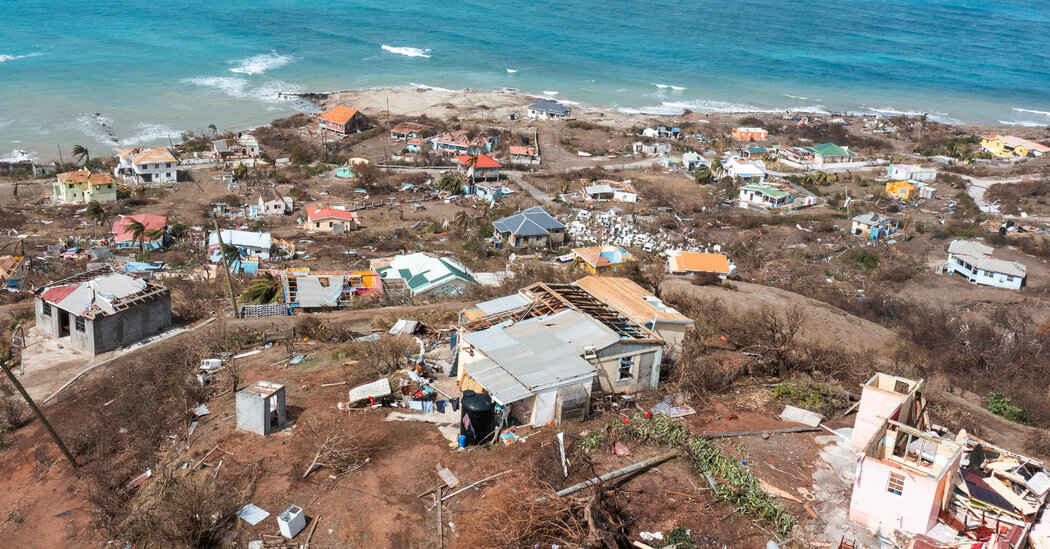Relief efforts were underway in New York City’s Caribbean community on Wednesday as residents monitored Hurricane Beryl’s path with anxiety and sorrow.
At least seven people have been killed by the storm in the Southeast Caribbean, with thousands left without power. By Wednesday afternoon, Beryl had weakened from a Category 5 to a Category 4 hurricane as it passed just south of Jamaica, lashing the island with damaging winds and flooding rainfall.
In the Little Caribbean neighborhood of Brooklyn, people with family and friends in Jamaica closely watched the storm’s progress.
Nadine Ducille, a cook at Caribbean Vibes Jamaican Restaurant and Bakery on Nostrand Avenue, said that she had been calling family members every couple of hours.
“My family so far is OK, they’re prepared,” Ms. Ducille, 50, said. “They’re just waiting to see what’s going on.”
Down the street at Mozeal Botanica, a shop selling religious figurines and candles, Grace Clark, an employee there, said she had urged her children in Portland Parish, Jamaica, to fill their storage tanks with plenty of clean water and to keep their cellphones fully charged, in case of loss of power.
“I get down on my knee and pray for covenants over the people,” Ms. Clark, 50, said.
Eugene Pursoo, the president of the nonprofit group Caribbean Diaspora United, was born in Granada, an island nation devastated by the storm this week. A relative of his brother’s wife died, he said, when the hurricane prevented him from flying to the United States, where he was set to undergo an urgent medical operation.
Mr. Pursoo, who previously served as Granada’s representative to the United Nations, said he feared the long-term consequences that Beryl’s winds and rains would bring to the nation’s crops and economy.
“It’s sad because we are dealing with fragile economies, and whenever we suffer this kind of devastation, normally we don’t have the money,” Mr. Pursoo said. “I know how families live on the edge when those things happen.”
He lived through one such disaster himself: Hurricane Janet, which devastated Granada when he was a child in 1955, destroying houses and wiping out crops. Climate change has made severe weather events more common in the region, according to experts, and Mr. Pursoo said America’s Caribbean community knew how to respond.
“The thing I like about the Caribbean and our people, is that when you have something like that strike, we close ranks,” he said.
Leonie Ward, a secretary at Lenox Road Baptist Church in Little Caribbean, said Beryl had called to mind major storms from the 1980s and early 2000s.
“I can’t say we’re accustomed to this, but we have had Hurricane Gilbert and Ivan,” she said. “Because of the magnitude of it, we understand what can happen.”
Dr. Trevor Dixon, founder of the JAHJAH Foundation, a nonprofit that provides medical personnel after emergencies in Jamaica, was born on the island and traveled there to provide medical assistance after Hurricane Ivan in 2004. He said his father called him at the time, pleading for help.
On Wednesday, Dr. Dixon said he was “exhausted and anxious,” monitoring Beryl after a night shift at Jacobi Medical Center in the Bronx, where he works.
“I worked last night, but I’m still here, ready to go,” Dr. Dixon said. “Can’t sleep much because you’re on edge.”
He expected to fly to Jamaica early next week with several other volunteers. Dr. Dixon said standing water could cause major health problems in the wake of the storm, by providing a breeding ground for mosquitoes and leading to contaminated drinking water.
As soon as he woke up Wednesday morning, Mr. Pursoo said he began reaching out to leaders in New York’s Caribbean community to start organizing a relief effort. His biggest hurdle, he said, was finding a meeting space large enough to accommodate the 400 or 500 people he expected to turn up.
“We are a people who have always responded to the needs of our families and friends back home,” Mr. Pursoo said. “Whenever natural disasters strike, we are quite responsive to give from whatever we can.”
